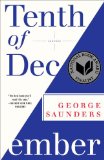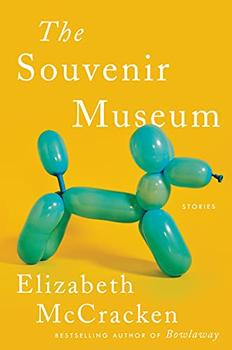Summary | Excerpt | Reviews | Beyond the book | Read-Alikes | Genres & Themes | Author Bio

Stories
by George SaundersSome may wonder what George Saunders, the brilliant and often bitingly satirical author whose work largely came of age during the George W. Bush administration, would find to focus on in this nominally less politically fraught time. It turns out that to a writer for whom humanity's moral imperatives - indeed the very essence of humanity itself - is at the center of his attention, there's still more than enough material to populate a devastatingly insightful collection like Tenth of December. The ten stories collected here, most of which were originally published in The New Yorker (as well as Story, Prospect, and Harper's magazines), hold up a brutally detailed mirror to the human condition, forcing us to examine ourselves – yellow teeth, wrinkles, warts, and all.
People do terrible things to one another in Saunders's stories. But, then again, this is true in real life, after all. In "Puppy," two women – both utterly convinced that they are in the right – offer starkly different models of motherhood. In "My Chivalric Fiasco," an employee at a medieval-themed park finds himself without a reliable moral compass – at least in our contemporary society – after he witnesses a colleague's rape.
And in "Escape from Spiderhead," a young man named Jeff finds himself at the center of a futuristic mind control experiment, as changing doses of pharmaceuticals rapidly and drastically alter his ability to articulate his feelings, perpetuate violence, and even feel love. Jeff's story raises questions about the true nature of the human condition, about whether people bear any endemic "goodness" or whether our desires and impulses are so malleable that they can be adjusted at the push of a button. Saunders has said that this story, one of the longest in the collection, was originally intended as the germ of a longer piece, possibly a novel. But it's clear from the amount of emotional intensity and efficiency of prose that Saunders packs into this finished shorter work that the author is truly a short-story writer at heart, a fact that readers should, and likely will, embrace.
All this may make it seem as if Saunders's collection offers only a bleak and relentlessly downbeat vision of the world. It's true that his satirical worldview appears to highlight only the worst of human actions and intentions. In the first and last stories in the collection, however, Saunders introduces moments of positive action and grace. "Victory Lap" - which also includes some of his most playful language, as he wittily captures the thought processes of a young teenage boy and girl - shows the positive outcomes of people overcoming fear in the face of evil. Likewise, the title story, which closes the collection, offers one model for how people can snap out of relentless introspection and the despair that can accompany it – through compassion and caring for others.
While Tenth of December can be read as moral commentary or as social satire, it can also be enjoyed more viscerally, as readers allow themselves to revel in the language in which Saunders himself clearly delights. The stories are full of inventive (and invented) words, of playful manipulations of vocabulary, tone, and syntax. At times it's exuberantly (and hilariously) vulgar. And at times his sentences – "A cardinal zinged across the day" – are just so utterly beautiful and alive that one can't help but stop and sigh a little. "Why were we made just so," asks one character in the final story, "to find so many things that happened every day pretty?" If characters can still ask questions such as these, it's clear that while hope is not easy to find in Saunders's world, it is not, in fact, all lost.
![]() This review was originally published in The BookBrowse Review in January 2013, and has been updated for the
February 2014 edition.
Click here to go to this issue.
This review was originally published in The BookBrowse Review in January 2013, and has been updated for the
February 2014 edition.
Click here to go to this issue.

If you liked Tenth of December, try these:

by Leif Enger
Published 2025
A career defining tour-de-force from New York Times bestselling, award-winning and "formidably gifted" (Chicago Tribune) author of Peace Like a River Leif Enger.

by Elizabeth McCracken
Published 2022
Award-winning author Elizabeth McCracken is an undisputed virtuoso of the short story, and this new collection features her most vibrant and heartrending work to date.
Your guide toexceptional books
BookBrowse seeks out and recommends the best in contemporary fiction and nonfiction—books that not only engage and entertain but also deepen our understanding of ourselves and the world around us.